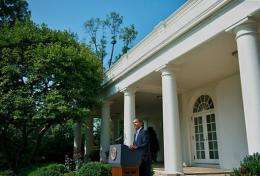Nations to seek clean energy cooperation

The world's top economies will look next week at ways to work together on clean energy, striking a rare note of cooperation amid an impasse in drafting a new climate change treaty.
Energy ministers or senior officials from 21 nations will gather Monday and Tuesday in Washington in an initiative by President Barack Obama's administration, which has made the creation of green jobs a top priority.
The US Energy Department said the two-day meeting will feature announcements of joint initiatives among the major economies, who together account for 80 percent of the world's gross domestic product.
Major economies have been at loggerheads over the shape of the next climate treaty, with developed nations seeking binding commitments from emerging economies such as China to cut carbon emissions blamed for global warming.
Clean energy has been considered one area of common interest. Obama signed a five-year, 150 million-dollar plan during a trip to China last year for the world's two biggest polluters to collaborate on developing electric cars and clean coal.
"The development of clean energy and energy-efficient technologies could spur the greatest economic opportunity of the 21st century," US Commerce Secretary Gary Locke said at the White House on Friday.
"The race is wide open for which country will become the epicenter of clean energy innovation, and the destination for the capital, businesses and jobs that come with it."
The Obama administration has often bemoaned that the United States is behind many European and Asian nations in developing green technology. But it said the meeting will look at ways in which nations can work together.
Areas for discussion include energy-efficiency standards, solar and wind power, and ways to provide energy to those without, said David Sandalow, the US assistant secretary of energy for international affairs.
Alden Meyer, director of strategy and policy at the Union of Concerned Scientists, doubted the meeting would sort out thorny issues in the talks to succeed the Kyoto Protocol, whose obligations run out in 2012.
"But if this is the low-hanging fruit that can show that countries can cooperate to get something done together, that could improve the mood," he said.
Terje Riis-Johansen, Norway's minister for petroleum and energy, praised the United States for convening the meeting and hoped it would "establish a global partnership to raise production of and access to clean energy."
"A greater reliance on clean energy is needed to solve climate change," he said. The minister also plans to visit New Orleans to learn lessons of the BP spill for Norway, whose oil and gas industry is almost entirely offshore.
The countries taking part in the talks are Australia, Brazil, Britain, Canada, China, Denmark, Finland, France, Germany, India, Italy, Japan, Mexico, Norway, Russia, South Korea, Spain, South Africa, Sweden, the United Arab Emirates and the United States.
EU Energy Commissioner Guenther Oettinger will also participate. Indonesia was invited but its minister had a scheduling conflict, Sandalow said.
The meeting in Washington comes as Obama presses Congress to approve the first-ever US plan to require carbon emission cuts. The House of Representatives approved a plan more than a year ago, but legislation has faced dogged opposition in the Senate.
(c) 2010 AFP


















